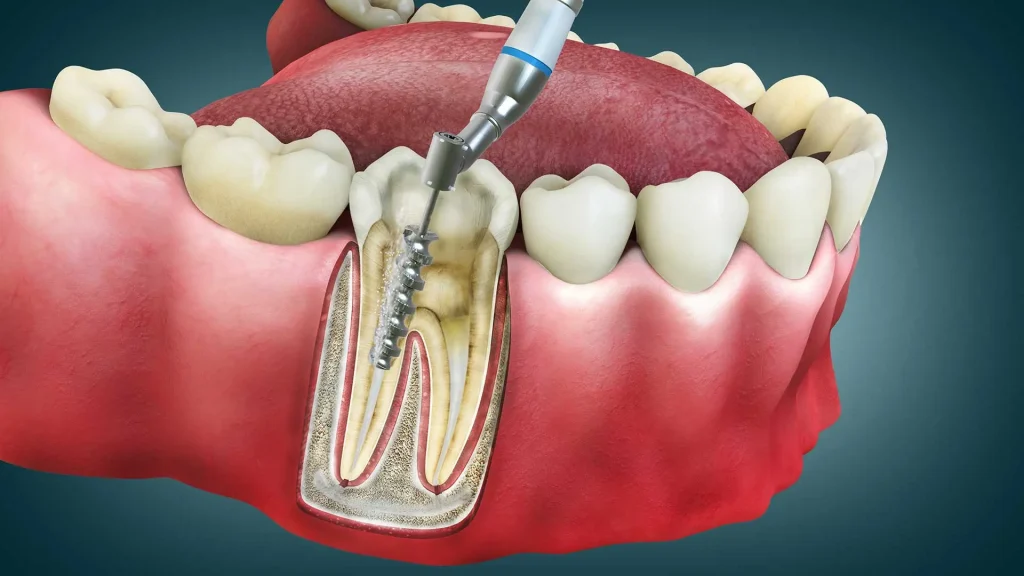Endodontics
Proven Solutions
As a close follower of ever-evolving technology, we support your health with proven solutions.
Wide Product Range
We are here for you with our technological tools, devices and materials that directly support your dental health.

Endodontics is the branch of dentistry that deals with diseases of the pulp tissue (nerves, blood vessels, and connective tissue) located inside the tooth. It encompasses specialized methods used to preserve tooth vitality or treat infected tissue. Root canal treatments, performed to clear infections in the root canals and save the tooth, are the fundamental practice of endodontics.
The Importance of Endodontics
Tooth decay, trauma, or deep restorations can damage the pulp. If left untreated, infection, abscesses, and tooth loss can result. Endodontic treatment preserves the natural tooth and helps maintain chewing function and aesthetics.
Our Endodontic Services
1. Root Canal Treatment (Endodontic Treatment)
Intracanal Cleaning: Complete removal of infected or inflamed pulp tissue from root canals.
Root Canal Shaping: Enlarging and shaping root canals with special instruments.
Root Canal Filling: Filling the cleaned canals with special filling materials to ensure a leak-proof seal.
Treatment of Multi-Rooted Teeth: Careful treatment of complex root canals, especially those found in molars.
2. Re-Endodontic Treatment (Re-Root Canal Treatment)
Re-treatment of the tooth in cases where previous root canal treatment has failed.
It is applied if there is root tip inflammation, root canal infection or leakage of the root canal filling.
3. Root Tip Surgery (Apicoectomy)
Surgical removal of pathologies such as cysts and abscesses at the root tip or where root canal treatment is inadequate.
Cutting off the root tip and removing infected tissue.
4. Post-Traumatic Endodontic Intervention
Root canal treatment or preventive treatments after tooth fractures, dislocations and other traumas.
Preserving the vitality of the tooth and ensuring that the tooth remains in the mouth for a long time.
5. Digital Techniques in Root Canal Treatment
Use of a Microscope: Clear visibility of intracanal details and precise intervention.
Electronic Channel Length Measurement: Devices that reduce the amount of radiation and determine the channel length accurately.
3D Imaging: Detailed evaluation of the canal structure in difficult cases.
Endodontic Treatment Process
1. Examination and Diagnosis
The condition of the tooth is evaluated through clinical examination and radiographic examination.
The extent of infection, canal structure and other factors are determined.
2. Treatment Planning
The appropriate root canal treatment method and alternatives are explained to the patient.
Information is given about the number of treatment sessions and the process.
3. Root Canal Treatment Application
The procedure area is numbed with local anesthesia.
The infected pulp tissue is removed, the canals are cleaned and shaped.
The channels are filled with special materials.
The tooth is restored temporarily or permanently.
4. Control and Monitoring
After treatment, the healing process of the tooth is monitored.
If there are complications, intervention is made.
Factors That Increase Success in Endodontic Treatment
Early Intervention: Initiating treatment before the infection progresses.
Hygiene and Sterilization: Sterile instruments and the environment reduce the risk of infection.
Use of Modern Technology: Treatment success increases with microscope and digital imaging.
Expertise and Experience: The intervention of a dentist specialised in endodontics is vital.
What Should Be Considered After Endodontic Treatment?
Mild pain and tenderness are normal after the procedure. Painkillers recommended by your doctor can be used.
Hard and sticky foods should be avoided for the first few days.
The tooth must be protected with a permanent filling or crown.
Regular dental check-ups should be performed.
Frequently Asked Questions
Is root canal treatment painful?
Thanks to modern anesthesia techniques, the procedure is generally painless.
How many sessions does root canal treatment take to complete?
Depending on the condition of the tooth, treatment can be completed in 1-3 sessions.
What happens if treatment is unsuccessful?
Alternative methods such as repeat root canal treatment or root canal surgery may be applied.
Why Should You See an Endodontist?
It accurately diagnoses and treats infections and damage to the roots of teeth.
It ensures the preservation of the natural tooth by saving the tooth from extraction.
Performs successful treatment in complex root canals with special techniques.
Conclusion
Endodontics aims to create a long-lasting and functional oral structure by protecting the internal health of the tooth. Our expert team provides reliable services for root canal treatment and all related endodontic interventions using modern technology and meticulous practices.
EOT Clinic Ankara
Current Content
With our current posts, we aim to both support and inform your health. You can also benefit by reviewing our content prepared in this direction.
You can contact us
You can reach us and get support whenever you need via our WhatsApp button on the right.



